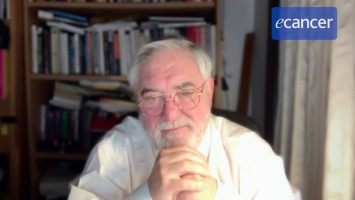IARC 50th Anniversary Conference
Implementing strategies to prevent cancer
Dr Graham Colditz - Washington University in St. Louis, St. Louis, USA
We have known how to prevent select cancers for some time but what are the issues in implementing prevention?
You are so right to say that we know cancer, more than half is preventable; the gap between that knowledge and implementing effective programmes is really an embarrassment for public health and cancer prevention more broadly. The barriers include the actual health system being somewhat, call it, disorganised, not with a system of flow from if it’s screening to diagnosis and treatment. It tends to take each behaviour one at a time so one day you may get a message, if you’re lucky, from a primary care provider, general practitioner, about smoking, another time about diet and it’s actually all got to be integrated into wellness.
Is it just the healthcare system? There are many additional pressures such as political and commercial.
To sustain prevention we actually need the political and policy functions in place as well as the healthcare providers. Too often we have one in place and not the other. Think of tobacco where we need policies around taxation, access, advertising as well as access to smoking cessation. So smoking cessation often has a provider component, obviously taxation, advertising. You look around the world, countries have dramatically different ways of responding to the absolute richest evidence that these strategies work. So it’s really bringing the political will, social awareness and providers all together with regulation.
What is your stance on persuasion versus legislation in regards to policy?
Whether it’s legislation or other ways of implementing policy, just having a policy that says everyone can go and get screened doesn’t mean that everyone runs off and gets large bowel screening. We’ve got really good evidence that in the US the Medicare, healthcare for people over 65 since the late 1990s covering colorectal cancer screening, we have huge disparities within the country and that’s access to providers, providers recommending taking time off work, actually getting the screening test if you get that picture. So policy on its own is not enough, providers on their own is not enough and we too often aren’t working together.
What is your method of making cancer prevention successful?
If we really work to bring stakeholders together, be that the state and federal public health agencies, the cancer society, academics, community groups, all together to sit at the table and get common goals and, in essence, an agreement across all those levels. When we do that we can actually move prevention forward and sustain it.
There is no universal agreement on which diet is best for cancer prevention. How do you resolve this issue?
I actually step back and, again, we can look at IARC reviews and come out to a diet with more fruits, vegetables, fibre, wholegrains and avoid weight gain. The energy balance issue to me is one of the dominant pieces that gets lost when we go off and fight over which fad is best or is it fibre, is it fruits and vegetables. If we move back to a plant-based diet we will lower heart disease, diabetes and cancer risk.
What are the calls to action in cancer prevention?
Top of the list for the medical profession in high income countries are clearly tobacco control, smoking cessation, HPV vaccine for boys and girls in adolescence and colorectal cancer screening for the adult over 50 population, all highly effective and not being fully used. Then the power of avoiding weight gain becomes the goal we should all have for all of our life. So promoting physical activity and balancing diet, moving to actually a more plant based, less red meat, diet will be a real strategy to sustain health and avoid cancer.
How important is screening for cancer?
For colorectal cancer it can go close to 40-50% reduction in incidence and mortality from colorectal cancer. For breast it’s a smaller benefit but a clear benefit. And for cervical cancer we’ve got the balance of vaccine for the younger generations but continuing either Pap smear or now HPV testing for women through middle age.
What is your take home message?
We really have to move prevention to top of the list, it should be the first way we fight cancer. A cancer avoided is one we don’t need to treat and we know how to prevent the majority of cancer but we aren’t acting on that. So moving this up to top of the list is absolutely the way and smoking is really the best place to start.








